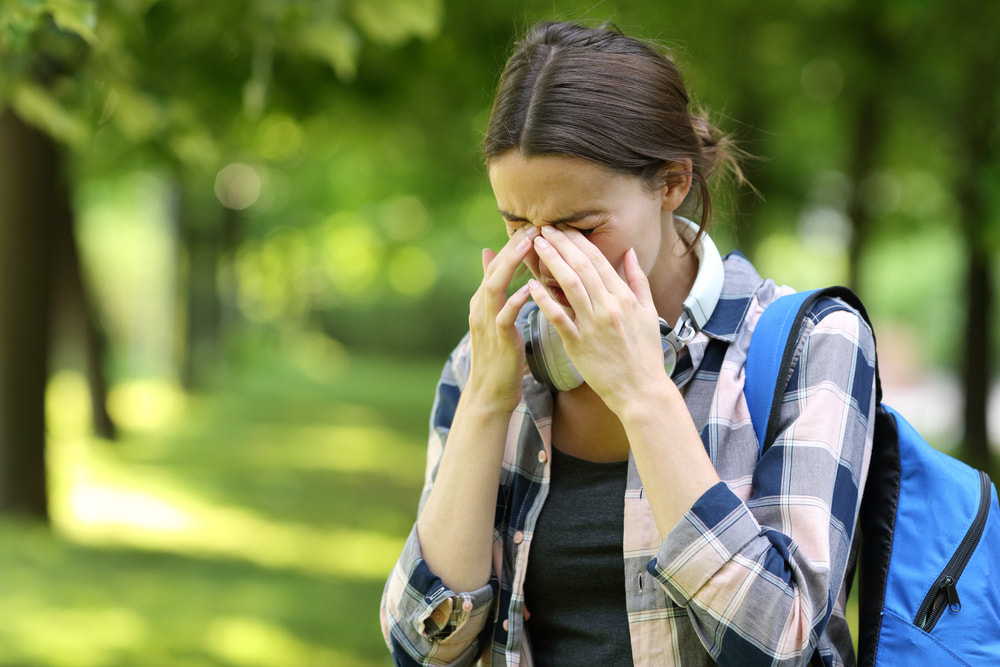What causes itchy eyes?If you have allergies, your body overreacts to typically harmless substances. When you come in contact with an allergen, your body’s immune system responds to the allergen as if it is dangerous. This causes a response, including the release of histamines. The release of histamine plays a role in common allergy symptoms, such as itchy eyes. One of the most common culprits of allergies is pollen. Pollen levels often soar during the spring months when plants are in bloom. Pollen levels also vary depending on the part of the country you live. The weather outside may also affect pollen counts. For example, on dry, windy days, the trees often release pollen into the air. The amount of time you spend outside also affects how severe your symptoms may become. Itchy eye symptomsItchy eyes are one of the most common eye allergy symptoms. For some people, the only symptoms they develop is itchy eyes, but for others, additional symptoms develop, including:
Complications of itchy eyesItchy eyes do not typically cause vision issues, but frequently rubbing your eyes because they are itchy can become a problem. Rubbing your eyes too much can potentially cause issues such as the following:
Infection: Rubbing your eyes is an easy way to transfer germs from your hands into your eyes. Unless you are constantly washing your hands, you may have bacteria or other germs on your hands. Germs can get into your body through your eyes. This means even illnesses that do not directly affect the eyes, such as the flu, are sometimes transmitted through touching your eyes. Dark circles: You might not think rubbing your eyes can cause dark circles, but it is possible. Rubbing too vigorously can damage the delicate skin under the eyes. This makes the blood vessels more visible, causing dark circles. Corneal abrasion: If you rub your eyes too hard, it can possibly lead to a corneal abrasion. A corneal abrasion can become painful and has the potential to damage your eyes. Increased redness: Rubbing your eyes may cause irritation. It may also spread the allergen and lead to even more of an allergic response. This can increase itching and redness. Treating itchy eyes: According to the American College of Allergy, Asthma, and Immunology, one of the best ways to deal with itchy eyes from allergies is to avoid the allergen. While that may seem like a no-brainer, it can be easier said than done. Additional ways to reduce itchy eyes include: Take an antihistamine: An oral antihistamine can prevent an allergic response before it starts, reducing itchy eyes. Use eye drops: Various types of eye drops are available, including antihistamine eye drops, artificial tears, and mast cell stabilizer drops that prevent histamine. Wear sunglasses: If you are allergic to pollen, wearing sunglasses may reduce the amount of pollen that gets into your eyes. Wash your face as soon as you come in from outside: Washing your face as soon as you come in from the outdoors helps get the pollen off the skin around your eyes. This may decrease how much pollen gets into your eyes. We hope the information above helps you manage springtime allergies and reduces itchy eyes. If you would like to ask whether an appointment with one of our eye doctors would be appropriate at this time, call our office at 508-746-8600. Comments are closed.
|
EYE HEALTH BLOGCategories
All
Archives
July 2024
|
|
Kadrmas Eye Care New England
55 Commerce Way, Plymouth, MA 02360
14 Tobey Road, Wareham, MA 02571 133 Falmouth Road (Rt 28), Mashpee, MA 02649 |
Phone Number:
1-508-746-8600 Hours: Monday through Friday — 8 AM – 4:30 PM |


 RSS Feed
RSS Feed
